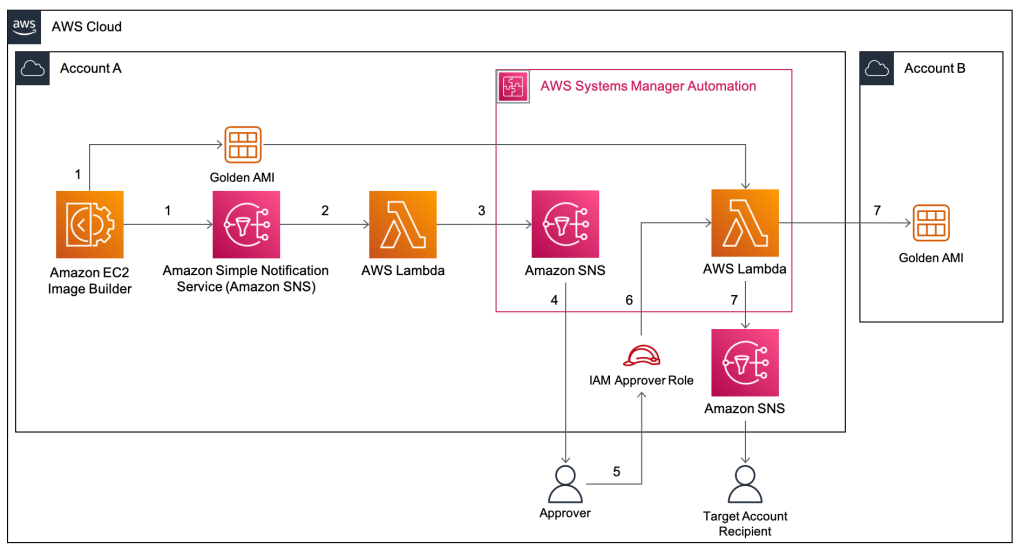AWS Compute Blog
Adding approval notifications to EC2 Image Builder before sharing AMIs
This blog post is written by, Glenn Chia Jin Wee, Associate Cloud Architect, and Randall Han, Professional Services. You may be required to manually validate the Amazon Machine Image (AMI) built from an Amazon Elastic Compute Cloud (Amazon EC2) Image Builder pipeline before sharing this AMI to other AWS accounts or to an AWS organization. […]
Best Practices for Hosting Regulated Gaming Workloads in AWS Local Zones and on AWS Outposts
This blog post is written by Shiv Bhatt, Manthan Raval, and Pawan Matta, who are Senior Solutions Architects with AWS. Many industries are subject to regulations that are created to protect the interests of the various stakeholders. For some industries, the specific details of the regulatory requirements influence not only the organization’s operations, but also […]
Deploying Local Gateway Ingress Routing on AWS Outposts
This post is written by Leonardo Solano, Senior Hybrid Cloud Solution Architect and Chris Lunsford, Senior Specialist Solutions Architect, AWS Outposts. AWS Outposts lets customers use the same Amazon Virtual Private Cloud (VPC) security mechanisms, such as security groups and network access control lists, to control traffic flows for on-premises applications running on Outposts. Some […]
Diving Deep into EC2 Spot Instance Cost and Operational Practices
This blog post is written by, Sudhi Bhat, Senior Specialist SA, Flexible Compute. Amazon EC2 Spot Instances are one of the popular choices among customers looking to cost optimize their workload running on AWS. Spot Instances let you take advantage of unused Amazon Elastic Compute Cloud (Amazon EC2) capacity in the AWS cloud and are […]
How to prepare your application to scale reliably with Amazon EC2
This blog post is written by, Gabriele Postorino, Senior Technical Account Manager, and Giorgio Bonfiglio, Principal Technical Account Manager In this post, we’ll discuss how you can prepare for planned and unplanned scaling events with Amazon Elastic Compute Cloud (Amazon EC2), and make sure that your infrastructure is ready to sustain increased compute power requirements. […]
Selecting Network Switches for Your AWS Outposts
This blog post is written by, Frankie Negro, Outposts Solution Architect. AWS Outposts is a family of fully managed solutions that extend AWS infrastructure, services, APIs, and tools to customer premises. Outposts is available in a variety of form factors, from 1U and 2U Outposts servers (https://thinkwithwp.com/outposts/servers/) to 42U Outposts racks (https://thinkwithwp.com/outposts/rack/). AWS Outposts is […]
Automating Amazon EC2-Windows EBS Volumes monitoring and creating alarms
This blog post is written by, Santhosh Kumar Adapa, Database Consultant, AWS WWCO ProServe, Jeevan Shetty, Database Consultant, AWS WWCO ProServe, and Bhanu Ganesh Gudivada, Consultant Databases, AWS WWCO ProServe. Customers who are running fleets of Amazon Elastic Compute Cloud (Amazon EC2) instances use advanced monitoring techniques to observe their operational performance. Capabilities like aggregated and […]
Configuring low latency connectivity between AWS Outposts rack and on-premises data using CoIP
This blog post is written by, Leonardo Azize Martins, Cloud Infrastructure Architect, Professional Services. AWS Outposts rack enables applications that need to run on-premises due to low latency, local data processing, or local data storage needs by connecting Outposts rack to your on-premises network via the local gateway (LGW). Each Outpost rack includes a local […]
Understanding the lifecycle of Amazon EC2 Dedicated Hosts
This post is written by Benjamin Meyer, Sr. Solutions Architect, and Pascal Vogel, Associate Solutions Architect. Amazon Elastic Compute Cloud (Amazon EC2) Dedicated Hosts enable you to run software on dedicated physical servers. This lets you comply with corporate compliance requirements or per-socket, per-core, or per-VM licensing agreements by vendors, such as Microsoft, Oracle, and […]
Use AWS Nitro Enclaves to perform computation of multiple sensitive datasets
This blog post is written by, Jeff Wisman, Principal Solutions Architect and Andrew Lee, Solutions Architect. Introduction Many organizations have sensitive datasets that they do not want to share with others because of stringent security and compliance requirements. However, they would still like to use each other’s data to perform processing and aggregation. For example, […]









